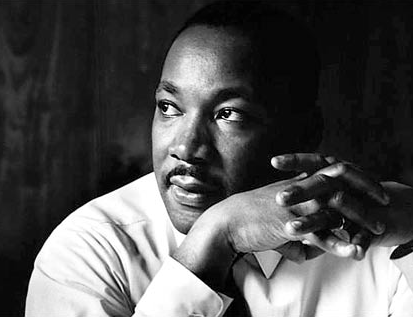
From
The Martin Luther King, Jr. Papers Project (link has brief sound clip when opened):
"We must meet hate with love. We must meet physical force with soul force. There is still a voice crying out through the vista of time, saying: Love your enemies, bless them that curse you, pray for them that despitefully use you. Then, and only then, can you matriculate into the university of eternal life. That same voice cries out in terms lifted to cosmic proportions: He who lives by the sword will perish by the sword. And history is replete with the bleached bones of nations that failed to follow this command. We must follow nonviolence and love."
- Reverend Dr. Martin Luther King, Jr., May 17, 1957
We so often remember only one of Doctor King's speeches, and even then only the parts about the idyllic dreamscape he painted, where we are judged solely by the "content of our character." We (Americans) like to pat ourselves on the back for a job well done, a dream made real. In reality, our accomplishments are on paper only. We still underfund schools with high minority populations; we are once again sending poor and minority soldiers -- many of whom signed up as reservists for the promise of education -- to fight brown people in foreign lands.
Dr. King was not just the watered-down dreamer of our popular culture. He made demands on the political regime of the time, and he
showed us the connection between civil rights at home and the need for peace abroad (link will open a .pdf file).
"I Have a Dream" is one of the greatest speeches ever made, from any number of standpoints, but it is shameful that the only portions we pay any attention to today are the last four paragraphs. The dream is contingent on America's success in overcoming the bankruptcy of it's "bank of justice," described in the beginning of the speech, and making good on promises of equality. It is contingent on cooperation between peoples, and Dr. King warns against the separtist militancy that some factions of the movement had come to espouse. It is contingent on a new understanding of the phrase "all men are created equal," accepted by every citizen and all lawmakers as the governing principle of our country's foundation.
We may be closer to this dream, but we do not yet deserve the credit we give ourselves for having realized the dream. In the first speech I linked, Dr. King quotes one of my favorite poems,
"Let America Be America Again" by Langston Hughes; and so I will, too.
O, let America be America again--
The land that never has been yet--
And yet must be--the land where every
man is free.
The land that's mine--the poor man's, Indian's, Negro's, ME--
Who made America,
Whose sweat and blood, whose faith and pain,
Whose hand at the foundry, whose plow in the rain,
Must bring back our mighty dream again.
Happy birthday, Dr. King. We're still working on it.
 Confessions of a Heroine Addict
Confessions of a Heroine Addict










